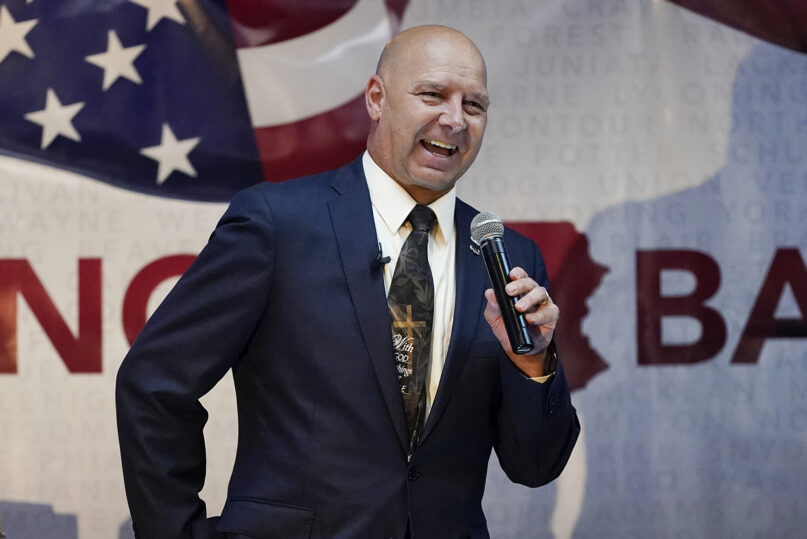(RNS) — After Tuesday night’s triumph for state Sen. Doug Mastriano in Pennsylvania’s Republican gubernatorial primary, Christian nationalism is taking another victory lap.
That’s not a roundabout way of saying the Trump candidate won; all of the candidates in the GOP field were Trump sellouts who refuse to admit that President Joe Biden defeated their idol in the 2020 election. Mastriano is a special case: Apart from his own allegiance to Donald Trump (and the former president’s endorsement days before the election), Mastriano campaigned as a bona fide Christian nationalist.
With rhetoric about “bringing the state back to righteousness” and opposing “forces of darkness,” Mastriano, who protested outside the Capitol on Jan. 6, 2021, wove typical “Make America Great Again” rhetoric and distortions with exclusivist Christian arguments, patently appealing to primary voters who have merged their faith with their politics and are attuned to calls to spiritual warfare. In their minds, divinely appointed leaders are tasked with restoring America to its founding as a land of privileged white Christians. Many of them put Trump in that category.
But it’s important to discern between Christian nationalists and self-professed Christians who cast aside their integrity to go along with Trump’s indecency, lies and unconscionable attacks on our democracy. Trump himself certainly used rhetoric and promoted polices that would appeal to Christian nationalists, but relatively few Republicans actually want to attack religious minorities or enshrine Christianity into law. According to a Baylor University study in 2021, only about a third of Republicans “strongly embrace the idea that Christianity should be fused with American civic identity.”
RELATED: With Roe in peril, abortion rights advocates prepare appeals to religious liberty
Muddying the waters further, when Trump’s language or optics veered into the realm of Christian nationalism — as when he confected a photo op of himself holding a Bible in front of a church — no one worried that it was actually spurred by Trump’s Christian devotion.
As a result, conservatives could portray Christian nationalism as a boogeyman when it was applied across the board to all Republicans. They could plausibly claim that the media and the left overused the term, especially as relatively few of them actually wanted to attack religious minorities or use political power for narrow Christianist ends. Crying “Christian nationalism” only makes the real thing more dangerous.
But while Trump and some other Republicans have pulled off the trick of selectively promoting Christian nationalism without the burden of believing a word of it, Mastriano seems to be the real McCoy. In late April, according to The Philadelphia Inquirer, Pennsylvania’s new GOP nominee for governor told a crowd at a Christian patriots’ event: “We have the power of God with us. We have Jesus Christ that we’re serving here. He’s guiding and directing our steps.”
If God is on his side, his opponents are necessarily out of favor with heaven: “And God has turned the tables on the Democrats and those who stand against what is good in America,” he said.
Talk like this now presents Trump’s Republican Party with a dilemma: how to activate aggrieved, culturally Christian white voters without being so extreme that independents and even some Republicans will turn to the Democrats in general elections. In battleground states such as Pennsylvania, which already leans sightly Democratic, Christian nationalism is a political loser.
RELATED: On immigration, DeSantis chooses Trumpism over Catholicism
Mastriano, having already won the support of Christian nationalists in the state, may find it smart to move away from extremism in the general election campaign, especially against the Democratic nominee, state Attorney General Josh Shapiro, who is Jewish. Soon we may hear Republicans say that Democrats are tagging Mastriano with Christian nationalism because they can’t beat him on the merits.
But the GOP’s new candidate for governor has likely emboldened Trump, who relishes his role as kingmaker and doesn’t correct for his mistakes. Even if Pennsylvania is eventually lost to the Democrats, the lesson he’ll take from Mastriano’s primary win is that Christian nationalism doesn’t hurt and could help — and, anyway, was as much a factor as Trump’s own support.
As the party looks to 2024, the future belongs not to Christians, but to whoever deceives and uses them most effectively. Same as always.
(Jacob Lupfer is a political strategist and writer based in Jacksonville, Florida. The views expressed in this commentary do not necessarily reflect those of Religion News Service.)





